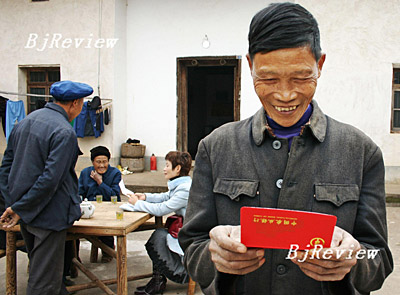
Ten years ago, the Chinese Government set up a basic living guarantee system for the low-income urban population. Under this social security policy, a family whose income is lower than the basic living expenses measured and published by the local government can apply for basic living allowance from the local government.
Formerly enjoyed only in urban areas this social security is expected to cover China's entire rural population of 800 million people by the end of this year. When the per-capita income in a family is lower than local basic life expenses, farmers are entitled to a basic living allowance that can meet the gap between their income and basic life expenses, whether their poverty is caused by disease, physical handicap, loss of working capacity or a harsh natural environment.
Delivering the 2007 government work report to the annual session of the National People's Congress (NPC), China's parliament, in March, Premier Wen Jiabao emphasized that the Central Government's plan to complete a nationwide rural basic living guarantee system in 2007 is a cornerstone measure in promoting social fairness and building a harmonious society.
"This system is to make sure that people's basic needs in life are satisfied. It is to keep them well clothed and fed," said Civil Affairs Minister Li Xueju at a press conference on August 22. He announced that 23.11 million farmers were receiving basic living guarantee payments in August, a dramatic increase from 15.09 million beneficiaries at the end of 2006, which was quoted in Wen's work report.
On July 31, Vice Minister of Civil Affairs Li Liguo said all of China's 31 provinces, autonomous regions and municipalities had started to establish a rural basic living guarantee system. He added that he was confident that the Central Government's goal will be realized by the end of 2007.
Wider coverage
For childless senior citizens, physically challenged people and juveniles in rural areas, if they have neither working capacity nor anybody legally obliged to support them, they are entitled to something called Five Guarantees security, which is paid by their village or township government. The Five Guarantees system, which began in 1956, mainly covers food, clothing, housing, medical treatment and burial. For juveniles, their nine-year compulsory education is guaranteed. The latest regulation on the Five Guarantees security system said this group of disadvantaged people should also be provided with fuel, some pocket money and nursing home places when needed. Senior citizens can choose to live in public nursing homes in their villages or townships for free. They don't have to pay for it but their Five Guarantees benefits are paid directly to the nursing home.
Although this system, based on mutual assistance between farmers, has grown mature over half a century, it only applies to a small rural population. Official statistics show that only 5 million farmers were Five Guarantees beneficiaries in 2006. A large number of low-income rural families still fall outside of the social security network.
In 1999, the Chinese Government promulgated regulations on guaranteeing urban residents a minimum standard of living, which stipulated that urban residents whose family's per-capita income is lower than the local urban residents' minimum standard of living can receive basic subsistence assistance from the local government. In recent years major progress has been achieved in building this system, which had covered all urban citizens by the end of 2003.
This centerpiece social security program was started later and lags behind in rural areas. By the end of 2006, the basic living guarantee system had started in rural areas in 23 of China's 31 provinces, autonomous regions and municipalities, benefiting 150.9 million people. In the same year, 22.4 million urban citizens received allowances from the government, totaling 22.42 billion yuan.
